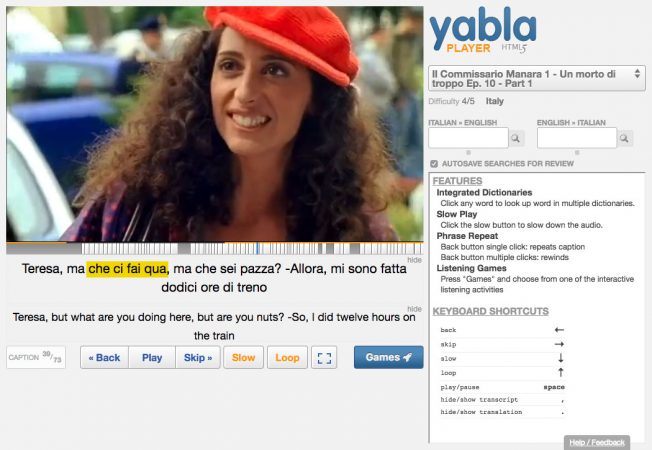Ciao a tutti! We’re continuing this week with phrases from Il Commissario Manara, a police drama from RAI (that’s the state-run Italian media company). For those of you who are new to our series La Frase Della Settimana, each week we’re focusing on a phrase that appears in natural Italian speech. The trick is to use the new phrase to express your own thoughts in real time. You will not need to do this too many times before the phrase becomes easy to remember.
We’re currently focusing on a single episode of Il Commissario Manara following along with Yabla’s verbatim Italian subtitles. Yabla is an excellent tool for developing an ear for spoken Italian. I personally use it to study two other languages in addition to Italian and it has certainly made a difference in my ability to understand spoken language.
Another benefit of course is that you discover idiomatic phrases that you can use immediately in your own spoken language.
Our phrase this week is:
Che ci fai qui?
What are you doing here?
Now I know what you’re thinking – what is that ci doing there? Well, that’s a good question and I don’t think even the Italians know. * It’s used mainly to make the sentence sound better and to cause a slightly different feel to the listener. But, that’s why it’s idiomatic. It’s best not to worry too much about it and just learn to understand it and use it for what it means. As you start to talk with real Italians the nuances will come. For now, among friends:
Ma, Giuseppe! Che ci fai qui? Pensavo che fossi in Italia questa settimana!
But, Joe! What are you doing here? I thought you were in Italy this week!
Don’t worry if you don’t understand the whole sentence. It’s only to show you an example of how you might use it. Suppose your friend shows up to a party you thought he wasn’t going to come. You’re talking to another friend of yours and you say:
Che ci fa qui?
What’s he doing here?
You get it.
Here’s some more examples:
Che ci faccio qui?
What am I doing here?
Che ci fanno qui a quest’ora?
What are they doing here at this hour?
Continuo a non capire che ci fanno qui questi due.
I still don’t understand what those two are doing here.
You can also say this in the past tense of course:
Che ci faceva qui?
What was he doing here?
You can, if you like, switch out qui for qua, if that suits you, as does Luca when he finally realizes his sister, Teresa, is in town:
Teresa, ma che ci fai qua?
Teresa, but what are you doing here?
This is an easy one! So, get started using it! Next time you bump into someone you didn’t expect to see, what are you going to say?
That’s right! Tell us how you used this phrase of the week on our Facebook page!
Yabla Italian is an excellent tool to help you develop an ear for spoken Italian. (I use Yabla personally to study three different languages.) With Yabla Italian you will have:
- verbatim subtitles in Italian
- access to English subtitles when you need them
- the ability to turn the subtitles off as you improve
- quizzes to gauge how well you’re doing
And… this is especially useful… you can slow the video down! Yes! We all know how fast the Italians talk. You know a lot of the words. If you just had a little more time to process them…. Well, now you do!
If you feel your Italian is good enough to watch without Italian (or English) subtitles, this episode of Il Commissario Manara is also available for free from RAI. You will need to fast forward to exactly 48 minutes for the start of Un morto di troppo.
* Examples like this are sometimes called pleonastic. Pleonasm is defined as: the use of more words than are necessary to express an idea; redundancy. There’s a lot of this sort of thing in Italian. For example:
Ce l’ho.
I have it.
You can see why the Italian prefer the redundancy, no? Without ce all you are saying is l’ho, which sounds a lot like lo. Could get confusing!




0 Comments